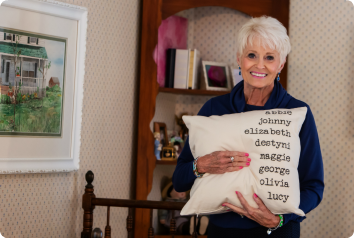 When Karen Broback received a call about a newborn who had been exposed to meth and amphetamines, she didn’t hesitate. Karen, a licensed foster care provider, cared for the infant for two and half months.
When Karen Broback received a call about a newborn who had been exposed to meth and amphetamines, she didn’t hesitate. Karen, a licensed foster care provider, cared for the infant for two and half months.
Children who form secure attachments in infancy are more likely to have healthy relationships throughout their life. Healthy brain development depends on having a caring bond with a primary caregiver, setting children up for long-term, strong mental health and resiliency.
“A baby has to bond to somebody,” Karen said. “That’s my job. They will then be able to reattach to someone else, because they’ve had that initial bonding.”
Karen knows this first hand. Since 1985, she and her husband, John, have been providing foster care to infants. They first started with Bridgecare and now provide Emergency Shelter Care, a new option through Children’s Home, and a service greatly needed in the community.
Bridgecare and Emergency Shelter Care offer safety and support to infants and children of all ages, ensuring there is a vital bond with a caregiver. A child in need of Emergency Shelter Care has experienced some type of recent trauma. A shelter care home provides a safe, warm bed so that the child does not have to spend their first night away from their parents in a hospital or center. The goal is for the child to be reunited with their parents; when this is not possible, the goal becomes for the child to be cared for by a
relative, or an adoptive or foster family when a relative is not an option.
“There are so many kids out there who need this care,” said Karen. “It’s such an important service.” Over the past 34 years, Karen has provided this crucial care for 126 of Minnesota’s most vulnerable children.
 Karen started as a foster parent, specializing in caring for infants, when her children were school age. Most of the infants stayed with Karen for about two months. One baby was in her care for 10 months. Karen was grateful to witness so many firsts. “We got to see the first tooth, we got to see her crawl, see her eat solid food for the first time,” said Karen. “I thought we were very fortunate to get to see her go through all those stages.”
Karen started as a foster parent, specializing in caring for infants, when her children were school age. Most of the infants stayed with Karen for about two months. One baby was in her care for 10 months. Karen was grateful to witness so many firsts. “We got to see the first tooth, we got to see her crawl, see her eat solid food for the first time,” said Karen. “I thought we were very fortunate to get to see her go through all those stages.”
Children of all ages enter Emergency Shelter Care for a variety of reasons. For some, their parents may be struggling with a mental health issue or addiction. For others, their foster home placement may have ended and there is not yet another foster home identified. All children have come from situations of abuse and neglect. Many infants have been born to a parent who was using alcohol or drugs and not able to care for them.
Many parents continue to reach out to Karen after their baby leaves her home. She recently received a letter from one young man after his 18th birthday. “His mom told him that I really made a difference in his life and he wanted to thank me,” said Karen. “A lot of times I’ll get really close to the birth mother when they come to visit. I make sure they understand the baby is safe.
“The babies have brought a lot of joy into our home,” said Karen. “They’ve taught my kids and my grandkids about life. I think it has made them better people — it has made them very compassionate. My kids are
great parents. I really attribute that to the foster care we did while they were growing up.”
No matter the length of time that Karen cares for a baby, she knows that wherever that child goes in life, the support that she offered will always be with them.
“Thinking of all the babies that I had for their first two months,” said Karen, “I was their person and John was their person, and our kids — they had a whole family of support.”
Karen continues to welcome new babies into her home whenever she receives a call.
Learn More About Foster Care

